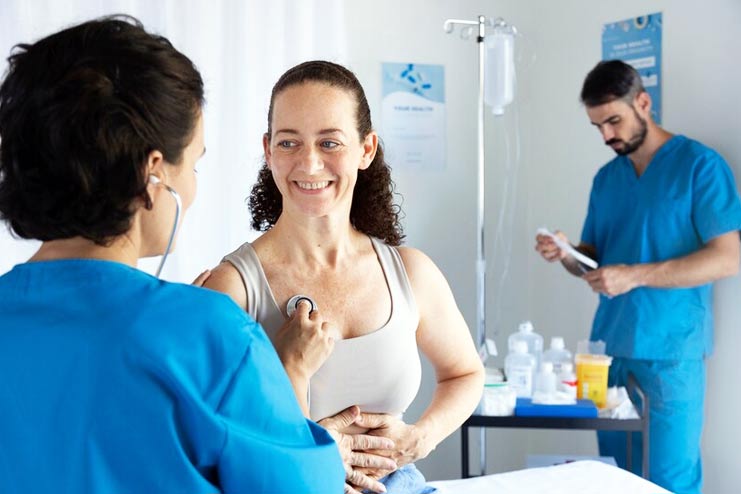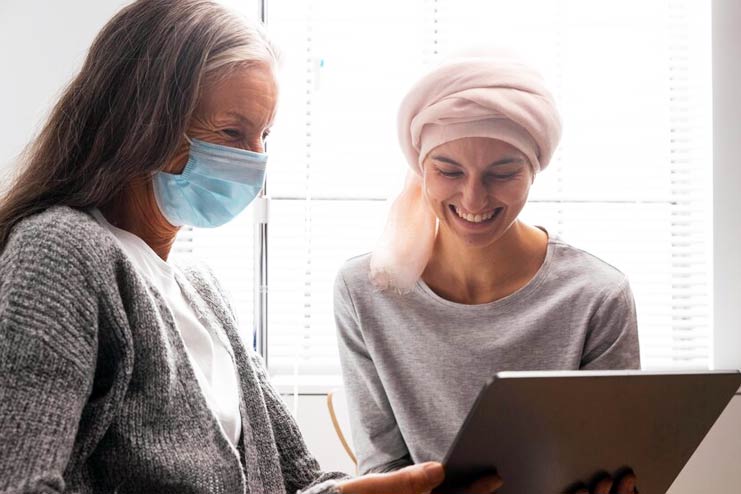Affiliate Disclaimer
Some links in this article are affiliate links. We may earn a small commission if you make a purchase through these links, at no extra cost to you. We only recommend products we find useful to our readersCervical cancer affects a substantial number of women all over the world. It is essential to have post-treatment care to guarantee long-term health and to prevent a recurrence of the cancer.
Cancer survivors are advised to prioritize healthy lifestyle choices into their daily habits, which will help to strengthen the immune system, improve general well-being, and increase quality of life.
In this article we offer advice and guidance that cervical cancer survivors can put into practice to lead a healthy life after undergoing cancer treatment. Implementing these recommendations into your daily routine to facilitate your recovery and embrace a future full of vitality and happiness.
1. Go for Regular Medical Follow-Ups

After cervical cancer treatment, scheduling and attending follow-up appointments and monitoring your health are essential. Regular check-ups enable medical professionals to identify any early warning signs of recurrence for prompt intervention.
Follow-up exams include Pap tests, HPV testing, and pelvic exams to detect any abnormalities. Blood and imaging tests, such CT and MRI scans help determine whether the cancer has spread or returned.
Attending these appointments is crucial for timely detection and early resolution of issues. Routine medical follow-ups are an essential part of a holistic post-treatment care plan that will provide you with peace of mind.
2. Maintain a Balanced Diet

A balanced diet provides our body with the nutrition it needs to repair and recoup, and boosts the immune system. Essential nutrients such as vitamins, minerals, antioxidants, and proteins are critical to post-treatment recovery.
Stay hydrated by consuming plenty of water throughout the day. Consume foods rich in vital nutrients, such as leafy greens, berries, lean proteins, whole grains, and healthy fats, which aid the body’s healing process and enhance energy levels.
Plan your meals to include a diverse variety of colorful fruits and vegetables, to ensure you receive a wide range of vitamins and minerals. Consume lean proteins such as chicken, fish, beans, and legumes which assist in tissue repair and help with muscle gain and strength. High fiber whole grains such as brown rice, quinoa, and oats benefit digestive health and provide a sustained release of energy.
Also, Read: Shake Up Your Protein Game: 7 Delicious Protein Shakes Available on Amazon
3. Get Physical Activity and Exercise

Regular physical activity is essential for cancer recovery and for overall well-being. The benefits include improvement in cardiovascular health, strength and flexibility, a decrease in fatigue, and it provides a mood boost.
Cancer survivors are encouraged to engage in physical activities such as walking, yoga, and strength training. Walking is low-impact and promotes cardiovascular fitness and endurance. Practicing yoga helps increase flexibility, reduces stress, and supports mental well-being. Strength training can help rebuild muscle mass, improve bone density, and speed up metabolism.
Related Article: Top 10 Essential Strength Training Equipment for Home Workouts
Begin by setting small, attainable goals to include some form of exercise in your daily routine. For example, you may go for a ten-minute stroll after each meal or stretch for a few minutes first thing in the morning. As you get fitter, gradually increase the length and intensity of your workouts. Engaging in physical activities that you enjoy and changing up your routine can help maintain your motivation and ensure that physical activity remains a continuous element of your recovery process.
Also, read: 7 Heart-Healthy Habits You Can Adopt in Under 5 Minutes a Day
4. Guard Your Emotional and Mental Health

Cancer patients who survive the disease may experience a variety of feelings, including anxiety about the disease returning, despair, and sometimes even guilt. The emotional and psychological effects of surviving cancer can be significant, and practicing holistic healing will help take care of your emotional and mental health.
Seeking support through therapy, counseling, or support groups to help you process your past experience and current feelings and emotions. Professional counselors and therapists can provide you with coping mechanisms, and support groups provide a sense of community and shared understanding.
Consider engaging in mindfulness and relaxation practices, such as meditation, deep breathing exercises, or journaling, to manage stress, anxiety, and depression effectively. Regular physical activity, consuming a balanced diet, and getting sufficient sleep are all factors contributing to improved mental health. You can further enhance your mental well-being and overall quality of life by participating in hobbies, increasing your time with loved ones, and setting attainable objectives.
5. Take Care of Your Sexual Health and Intimacy

Cancer recovery can bring about changes in sexual health and intimacy, which are important aspects of overall well-being. Following treatment, some survivors may have a diminished libido, experience discomfort during sexual activity, or feel emotional barriers to intimacy.
To get started, talk with healthcare providers who can provide direction, make treatment recommendations, or refer you to sexual health specialists. Additionally, it is necessary to maintain open communication with your partner – discuss your feelings, anxieties, and wants with them to cultivate understanding and support.
One strategy to improve sexual health and preserve intimacy is to explore various forms of physical love, such as cuddling or massages, which can build closeness without the strain of intercourse. By scheduling personal time together and using lubricants, you may help alleviate discomfort and put your relationship at the forefront of your priorities. It is essential to keep in mind that patience and mutual support are essential to successfully navigate these changes and maintain a meaningful, intimate life post cancer treatment.
6. Avoid Tobacco and Limit Alcohol

Avoiding tobacco products and limiting alcohol consumption is critical for cancer prevention and overall health, and especially during cancer recovery. Smoking and excessive drinking are linked to an increased risk of cancer recurrence. Nicotine and alcohol both have the potential to weaken the immune system and generate an environment that is favorable to the proliferation of cancer cells.
Quitting smoking is associated with a considerable reduction in the chance of recurrence of cancer and leads to improvements in lung and heart health. Reducing the consumption of alcohol helps reduce the possibility of developing a variety of malignancies, promotes liver function, and improves overall well-being. To lessen the likelihood of cancer recurring, give up smoking and limit the amount of alcohol you consume.
If you want to quit smoking, consider nicotine replacement therapy, attend a support group, or get professional counseling. Both behavioral therapy and drugs prescribed by a doctor are found to be helpful when trying to quit smoking.
To reduce the amount of alcohol you consume, establish clear boundaries on consumption, select alternatives that do not contain alcohol, and seek support from friends, family, or support groups if necessary.
Also, read: What Are The Effects Of Alcohol On Your Skin? 7 Alarming Side Effects
7. Stay Informed and Educated

Educate yourself about the latest breakthroughs in cancer research to make informed decisions about your health and available treatment options, gain reassurance, and enhance your confidence in your recovery.
A wide range of helpful materials such as medical journals, books, support groups and cancer societies are available. Up-to-date information regarding cervical cancer can be found in reputable sources such as the American Cancer Society, and the National Cancer Institute, and the National Coalition For Cancer Survivorship.
Books written by cancer survivors and medical professionals provide helpful insights and guidance that can be implemented. Become a member of survivor networks and support groups, to contact other individuals who have experienced similar things and who can provide you with emotional support.
Podcasts containing talks from loved ones, caregivers, survivors, and individuals coping with cancer.
Maintain a sense of curiosity, ask questions, and look for trustworthy sources of information to proactively engage in your health journey. You will be able to advocate for your needs, participate actively in your care, and cultivate a sense of empowerment through your recovery process.
Conclusion
After receiving treatment for cervical cancer, judicious post-treatment care is necessary to maintain a healthy life. Essential recommendations include maintaining a balanced diet, getting regular exercise and mental health support, and scheduling routine medical check-ups. To improve your outlook and avoid recurrence, cervical cancer survivors must incorporate some of these recommendations into their lifestyle.
Cervical cancer survivors can improve their outlook, limit the chance of recurrence and improve overall health and quality by being proactive with post-treatment care.
Read our article for more thorough information and resources. You’ll find help and advice specific to your experience as a cervical cancer survivor. Stay mindful, preserve your health, and anticipate a bright future.
Other Related Articles
References
- https://www.cancer.org/cancer/types/cervical-cancer/after-treatment/follow-up.html
- https://www.cancer.org/cancer/survivorship/be-healthy-after-treatment.html
- https://www.cdc.gov/cancer/features/cancer-survivors.html
- https://www.mayoclinic.org/diseases-conditions/cancer/in-depth/cancer-survivor/art-20044015
- https://www.cancervic.org.au/get-support/living-with-cancer/life-after-treatment/living-well-after-cancer
- https://cancer.ca/en/cancer-information/cancer-types/cervical/treatment/follow-up
- https://www.ncbi.nlm.nih.gov/pmc/articles/PMC2880906/
- https://www.cancerresearchuk.org/about-cancer/cervical-cancer/treatment/follow-up
- https://www.cdc.gov/cancer/php/change-packages/cervical-cancer-followup.html
- https://www.ncbi.nlm.nih.gov/pmc/articles/PMC4835009/
- https://obgyn.onlinelibrary.wiley.com/doi/10.1111/aogs.13855
- https://www.cancer.org/cancer/survivorship/be-healthy-after-treatment/eating-well-after-treatment-ends.html
- https://www.medicalnewstoday.com/articles/does-diet-influence-cervical-cancer-risk
- https://www.mdanderson.org/cancerwise/healthier-diet-for-cancer-survivors.h00-158832012.html
- https://cms.illinois.gov/benefits/stateemployee/bewell/getmoving/exercise-and-cervical-cancer.html
- https://www.cancer.org/cancer/survivorship/be-healthy-after-treatment/physical-activity-and-the-cancer-patient.html
- https://progressreport.cancer.gov/after/physical_activity
- https://www.cancer.gov/about-cancer/coping/feelings
- https://www.mayoclinic.org/diseases-conditions/cancer/in-depth/cancer-survivor/art-20047129
- https://www.cancer.org/cancer/managing-cancer/side-effects/emotional-mood-changes.html
- https://www.dana-farber.org/patient-family/survivors/caring-for-yourself-after-cancer/your-emotions-after-treatment
- https://www.nccc-online.org/hpvcervical-cancer/sexuality-cancer/
- https://www.jostrust.org.uk/information/living-with-cervical-cancer/sex-and-intimacy
- https://www.compassoncology.com/cancer-survivorship/family/sexuality-and-intimacy
- https://livestrong.org/resources/female-sexual-health-after-cancer/
- https://www.mdanderson.org/cancerwise/does-alcohol-cause-cancer.h00-159383523.html
- https://www.cancer.org/cancer/risk-prevention/diet-physical-activity/alcohol-use-and-cancer.html
- https://www.hemoncnc.com/cancer-treatment/tobacco-alcohol-cessation
- https://www.cancer.gov/about-cancer/causes-prevention/risk/alcohol/alcohol-fact-sheet
- https://www.vcuhealth.org/news/knowing-the-facts-is-important-a-conversation-with-cervical-cancer-survivor
- https://www.ncbi.nlm.nih.gov/pmc/articles/PMC8424614/
- https://journal.binayfoundation.org/article/32581-knowledge-attitude-and-practice-of-cervical-cancer-screening-among-women-attending-a-gynecology-clinic-at-a-tertiary-level-hospital
- https://www.medicalaidfilms.org/film/understanding-screening-treatment-and-prevention-of-cervical-cancer/
- https://www.cancersupportcommunity.org/get-educated-inspired
- https://www.healthline.com/health/cancer/inspiring-books-about-cancer
- https://www.lls.org/support-resources/suggested-reading/books-adult-patients-and-their-caregivers/living-cancer
- https://www.who.int/news-room/fact-sheets/detail/cervical-cancer
- https://www.cambridge.org/core/journals/palliative-and-supportive-care/article/cervical-cancer-survivors-the-experiences-of-the-journey
- https://www.cancercare.org/canceroutloud
In this Article

















